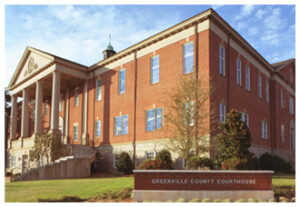Greenville Bail Bonds
It is common for people to not know what to expect regarding Greenville bail bonds in Greenville County Court until they or a loved one is arrested. As such, they often ask the same questions about the Greenville bail bonds, the bonding process, and the associated costs. Sly Bail Bonds team of over 60 licensed agents and 100’s of years of combined experience offer a no-wait, immediate prompt service 24/7/365!
Call (864) 710-4335
Our local Greenville Bail Bondsman is minutes from the Greenville County detention center and Greenville County Court!
210 W Stone StGreenville, SC. 29609
Stressful is the typical word that comes to mind when you or your loved one ends up in jail, and not knowing how Greenville bail bonds work can add on an extra element of frustration. Call your local Sly Bail Bonds agent to get the answers to the most common question about the bail bond process, and we even go into county specific laws since bail bonds can function differently from court to court – both in how bail works and how much bail costs. Although bail bonds are commonly used after an arrest occurs, we go into all the options that might be available to you, so you can be prepared to make the best decision. Below we attempt to provide general answers to the most asked questions to our local Greenville Bail Bondsman.
How Bail Is Set
Judges are responsible for setting bail. Because many people want to get out of jail immediately, Greenville County has a standard bail bond schedules that specify bail amounts for common crimes. An arrested person can often get out of jail quickly by paying the amount set forth in the station house bail schedule.
If there is not a bail schedule for their alleged crime a judge will set a bail amount in the arraignment hearing. In deciding whether to release the defendant pending completion of the case, courts primarily consider:
Judges will consider the following factors when setting an offender’s bond:
The nature and circumstances of the offenseThe defendant’s record of previous convictions
The defendant’s past record of appearance in court after being admitted to bail
The defendant’s family ties
The defendant’s employment record
The defendant’s financial resources
The defendant’s character and mental condition
The defendant’s community ties
The following are options that may be available to the court in deciding conditions of release:
- Release on the defendant’s own recognizance. Being released on your own recognizance (“ROR” or “OR”) means you are released on the basis of your promise to report for trial and any other court proceedings in your case. Courts usually release defendants ROR only in minor criminal cases or when the defendant has a minimal record of prior criminal offenses, if any, and a permanent local address and employment.
- Bond or bail. If the judge requires that a defendant post bond or bail, the defendant must post money with the court in order to be released pending completion of the case. The court can require a cash/surety bond or a deposit bond. If the bond is cash/surety, for instance, $10,000 cash – the defendant must post that amount with the court. Once the case is completed, the money is refunded, less any fees the court requires. If the court allows a surety bond, a bondsman or bail bondsman is permitted to post a surety note for the entire bond amount with a contract that the bondsman will pay the balance of the bail bond if the defendant does not appear for court and cannot be located. The defendant must pay the bail bondsman a nonrefundable portion of the bail bond (ten percent) and provide collateral – such as a deed to a home or other piece of real estate – or a co-signor, or both, to guarantee his appearance. If the defendant disappears and the bondsman is required to pay the bond to the court, the bondsman can collect that money from the co-signor or take possession of the collateral. In most cases, collateral is not required!
- Other conditions. In addition to ROR or requiring the defendant to post bail, the court can impose other conditions of release on the defendant, including no contact with witnesses, no use of drugs or alcohol, no association with other defendants, no new arrests, no association with known criminals, no possession of weapons, and no travel outside the county or state. If the defendant violates any of these conditions, the court can rescind the ROR or bond and hold the defendant without bond.
- Supervised release. In addition or as an alternative to setting a bond or other conditions of release, the court can place a defendant in a supervised release program while his case is pending. In some states, this is known as pre-trial supervision and is similar to being on probation while your case is pending. You will be required to report to a probation or other supervising officer and to comply with any conditions the officer sets such as the conditions listed above.
If the defendant cannot pay the bail bond amount on their own, they can seek help from a Greenville County Bail bondsman in the form of a Bail Bond. To post a Greenville County Bail Bonds, a defendant is required to pay 15% of the bail amount. If the defendant cannot pay all, Sly Bail Bonds can take a down payment and let you make payments on the balance. If it is a large bond you may have to provide some sort of collateral. Co-signing a bail bond means that you sign a promissory note or an indemnity agreement financially obligating themselves to pay the full amount of the bond if the accused person does not appear in court.
Bailed-out suspects commonly must comply with “conditions of release.” If a suspect violates a condition, a judge may revoke bail and order the suspect re-arrested and returned to jail. Some bail conditions, such as a requirement that a suspect “obey all laws,” are common. Other conditions may reflect the crime for which a suspect was arrested. For example, a condition may order a domestic violence suspect not to contact the alleged victim.
What happens next depends on if the defendant appears in court after being released.
- If the defendant fails to appear in court: The Bail Bond is forfeited and the court requires the bail bondsman to pay the court the entire amount of the bail bond.
- If a defendant does appear for court: Upon conclusion of the court case, the Bail Bond is dissolved and the collateral is returned to the person who posted it. The Bail bondsman keeps the 15% cash fee.
Conditions of Bail
Bailed-out suspects commonly must comply with “conditions of release.” If a suspect violates a condition, a judge may revoke bail and order the suspect re-arrested and returned to jail. Some bail conditions, such as a requirement that a suspect “obey all laws,” are common. Other conditions may reflect the crime for which a suspect was arrested. For example, a condition may order a domestic violence suspect not to contact the alleged victim.
Greenville County Courthouse
305 E North St
Greenville, South Carolina 29601
-
Greene County Court 13th Judicial Circuit Record Lookup
-
Greenville County Inmate Search
-
South Carolina Department of Corrections Inmate Search
Cities:
- Fountain Inn (partly in Laurens County)
- Greenville (county seat and largest community)
- Greer (partly in Spartanburg County)
- Mauldin
- Simpsonville
- Travelers Rest
Berea
Caesars Head
City View
Conestee
Dunean
Five Forks
Gantt
Golden Grove
Judson
Parker
Piedmont (partly in Anderson County)
Sans Souci
Slater-Marietta
Taylors
The Cliffs Valley
Tigerville
Wade Hampton
Ware Place
Welcome
Other unincorporated communities
Altamont
Batesville
Cleveland
Gowensville[59] Adjacent counties:
Henderson County, North Carolina – north
Polk County, North Carolina – northeast
Spartanburg County – east
Laurens County – southeast
Abbeville County – south
Anderson County – southwest
Pickens County – west
Transylvania County, North Carolina – northwest Zip Codes: 29601 Greenville
29602 Greenville
29603 Greenville
29604 Greenville
29605 Greenville
29606 Greenville
29607 Greenville
29608 Greenville
29609 Greenville
29610 Greenville
29611 Greenville
29612 Greenville
29615 Greenville
29616 Greenville
29617 Greenville

